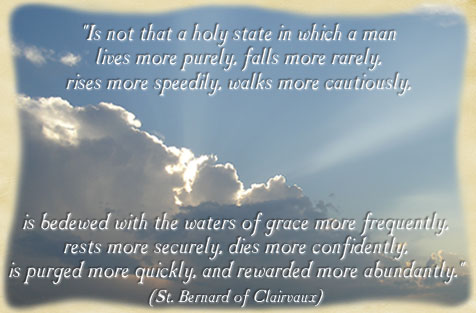

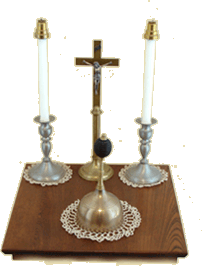
Horarium Outline
 monk’s day begins early in the morning, while most of the world is still
asleep. At four AM, before the sun has come up and before the birds have begun
to sing, the sound of the rising bell peals out through the dark hallways of
the monastery beckoning the sleeping monks to rise from their beds. They must
hurry after they wake up since they have to be in the church within 20 minutes
after rising for the beginning of the
Divine Office, Lauds, after which Prime and Tierce will be sung.
monk’s day begins early in the morning, while most of the world is still
asleep. At four AM, before the sun has come up and before the birds have begun
to sing, the sound of the rising bell peals out through the dark hallways of
the monastery beckoning the sleeping monks to rise from their beds. They must
hurry after they wake up since they have to be in the church within 20 minutes
after rising for the beginning of the
Divine Office, Lauds, after which Prime and Tierce will be sung.
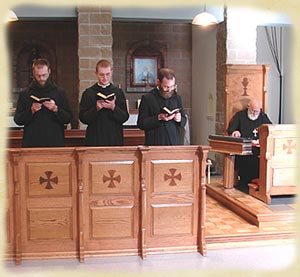
 his
morning Office is probably one of a monk’s greatest sacrifices. To wake up at
four in the morning and spend forty-five minutes chanting psalms does not come
easily to human nature. But that is the point. If it was easy and pleasant it
would not be much of a sacrifice. And so the monks can firmly hope that amidst
all their weariness and distractions their early morning prayer has done some
good for the world, that it has glorified God.
his
morning Office is probably one of a monk’s greatest sacrifices. To wake up at
four in the morning and spend forty-five minutes chanting psalms does not come
easily to human nature. But that is the point. If it was easy and pleasant it
would not be much of a sacrifice. And so the monks can firmly hope that amidst
all their weariness and distractions their early morning prayer has done some
good for the world, that it has glorified God.
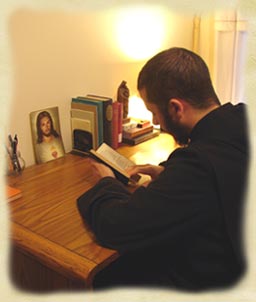
 hen
the morning Office is finished the monks walk back to their cells for a long
period of private prayer and spiritual reading. Often during the day, at times
like this, a monk finds himself in solitude, alone with God. Such moments are
precious to him, for it is then that he is most free to pray to his Heavenly
Father in secret and in peace.
hen
the morning Office is finished the monks walk back to their cells for a long
period of private prayer and spiritual reading. Often during the day, at times
like this, a monk finds himself in solitude, alone with God. Such moments are
precious to him, for it is then that he is most free to pray to his Heavenly
Father in secret and in peace.
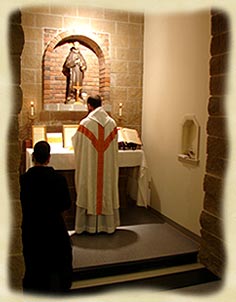
 he
Conventual Mass (the Mass for the monastic community) begins at 6 o’clock.
Private Masses are also said around this time on the various side altars of the
church. This is, for a monk, the most important time of the day. For this is
when he will have the enormous privilege of offering himself, with Christ in
the unbloody reenactment of Calvary, to the Father in reparation for the sins
of mankind. And not only will he give himself to God but he himself will
receive God in Holy Communion. The opportunity to receive Communion every day
is one of the greatest blessings of religious life. Nothing on this earth could
be more sanctifying. After Mass, the community has another period for spiritual
reading and holy solitude, time to cherish the gift Christ has made of Himself
in Holy Communion.
he
Conventual Mass (the Mass for the monastic community) begins at 6 o’clock.
Private Masses are also said around this time on the various side altars of the
church. This is, for a monk, the most important time of the day. For this is
when he will have the enormous privilege of offering himself, with Christ in
the unbloody reenactment of Calvary, to the Father in reparation for the sins
of mankind. And not only will he give himself to God but he himself will
receive God in Holy Communion. The opportunity to receive Communion every day
is one of the greatest blessings of religious life. Nothing on this earth could
be more sanctifying. After Mass, the community has another period for spiritual
reading and holy solitude, time to cherish the gift Christ has made of Himself
in Holy Communion.
 t
7:30 the monks gather in the refectory to eat breakfast, in silence. On most
mornings they have cereal and toast, but on fast days their morning meal
consists of bread and water, and coffee too, for those who want it. After
breakfast the grand (night) silence is broken for the day. This means that the
monks are free to speak, as necessity might require, until after Compline, when
the grand silence will again descend as a quiet and gentle blanket of peace,
enveloping the monastery in its rich folds. This night silence, as well as the
partial silence observed during the day, is not merely an empty external
silence but one which is full of God. External silence is one of the most
important ingredients for acquiring that interior quiet within the cloister of
the soul in which one can more easily hear the gentle voice of God and more
freely converse with Him by frequent heart to heart conversation, remaining in
His holy presence throughout the day.
t
7:30 the monks gather in the refectory to eat breakfast, in silence. On most
mornings they have cereal and toast, but on fast days their morning meal
consists of bread and water, and coffee too, for those who want it. After
breakfast the grand (night) silence is broken for the day. This means that the
monks are free to speak, as necessity might require, until after Compline, when
the grand silence will again descend as a quiet and gentle blanket of peace,
enveloping the monastery in its rich folds. This night silence, as well as the
partial silence observed during the day, is not merely an empty external
silence but one which is full of God. External silence is one of the most
important ingredients for acquiring that interior quiet within the cloister of
the soul in which one can more easily hear the gentle voice of God and more
freely converse with Him by frequent heart to heart conversation, remaining in
His holy presence throughout the day.
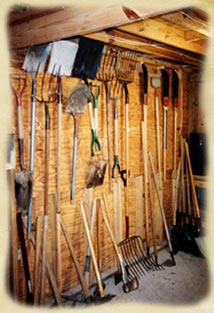
 fter
breakfast they make their beds and put their cells in order and have a little
more time to read if they wish before the morning work begins. At 8:30, all the
monks head off to their various employments. Some may go out to the barn or the
greenhouse, others may have work to be done in the office or at the computer.
Working in the kitchen, cataloging books in the library, grubbing out stumps in
the forest, cleaning house; a monk finds himself doing all sorts of things. Yet
to him it is all the same. It is simply the will of God, as manifested to him
by his superiors. He will, of course, find some jobs more agreeable and
interesting than others. This is natural, since every man has his own talents
and inclinations. And it is the duty of the Abbot to try, as much as possible,
to find the right man for the job. But it often happens that the needs of the
community require a monk to sacrifice himself by embracing, wholeheartedly and
for the love of God, an employment that, naturally speaking, he would much
rather avoid. This is his offering to God and it is one of the greatest
offerings he can make.
fter
breakfast they make their beds and put their cells in order and have a little
more time to read if they wish before the morning work begins. At 8:30, all the
monks head off to their various employments. Some may go out to the barn or the
greenhouse, others may have work to be done in the office or at the computer.
Working in the kitchen, cataloging books in the library, grubbing out stumps in
the forest, cleaning house; a monk finds himself doing all sorts of things. Yet
to him it is all the same. It is simply the will of God, as manifested to him
by his superiors. He will, of course, find some jobs more agreeable and
interesting than others. This is natural, since every man has his own talents
and inclinations. And it is the duty of the Abbot to try, as much as possible,
to find the right man for the job. But it often happens that the needs of the
community require a monk to sacrifice himself by embracing, wholeheartedly and
for the love of God, an employment that, naturally speaking, he would much
rather avoid. This is his offering to God and it is one of the greatest
offerings he can make.
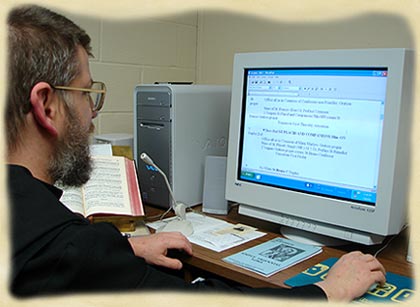
 he
morning work period draws to a close at 11 o’clock, at which time the monks
finish what they are doing, if they can, and go back to their cells to get
cleaned up and ready for choir. The two minor Hours of Sext and None are
chanted at 11:30. Afterwards they remain in the church to spend some time with
Christ and ask themselves if they have spent the morning with Him and for His
sake. The bell rings at noon, and after they have chanted the Angelus
they process though the cloister to the refectory for dinner.
he
morning work period draws to a close at 11 o’clock, at which time the monks
finish what they are doing, if they can, and go back to their cells to get
cleaned up and ready for choir. The two minor Hours of Sext and None are
chanted at 11:30. Afterwards they remain in the church to spend some time with
Christ and ask themselves if they have spent the morning with Him and for His
sake. The bell rings at noon, and after they have chanted the Angelus
they process though the cloister to the refectory for dinner.
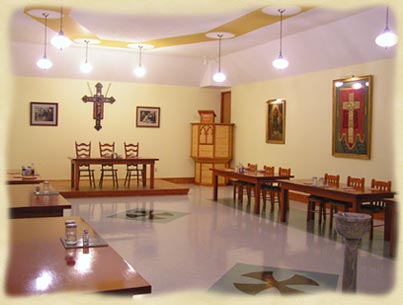
 monastic refectory is a unique and sacred place. A rectangular room with a high
ceiling and two rows of plain tables along the walls, at the head of which,
under a large crucifix, is another table on a raised platform, where the Abbot,
the Prior, and the Subprior sit. To the right of this table, seeming to grow
out of the wall, is the reader’s pulpit. At the two main meals, dinner (lunch)
and supper, a monk ascends to the top of this lonely height to read to the
community while they eat. The monks are thus able to nourish both body and
soul. The food is simple but well prepared, and the meals mostly consist of
vegetables, rice, pasta, eggs, bread and more pasta. Occasionally chicken or
fish is served, but almost never the flesh of four footed animals, since St.
Benedict wanted his monks to abstain from such a luxury out of love for God. At
supper, soup is always served except on Sundays when the community eats as they
do at dinner. When the meal is over the Abbot rings a little bell and the
reader chants: Tu autem Domine miserere
nobis (But You, Lord, are merciful to us), the monks respond:
Deo gratias (Thanks be to God). Then the monks chant the prayers which
are always said before and after dinner and supper. Thus the repast ends as it
began, with the praise of God. The community processes out of the refectory
chanting Psalm 50, the Miserere, on their way back to the Church where
they will make a visit to Christ in the Blessed Sacrament. Those appointed for
the week to wash dishes stay behind to do their humble duty, as the reader eats
the food that was kept warm for him in the oven.
monastic refectory is a unique and sacred place. A rectangular room with a high
ceiling and two rows of plain tables along the walls, at the head of which,
under a large crucifix, is another table on a raised platform, where the Abbot,
the Prior, and the Subprior sit. To the right of this table, seeming to grow
out of the wall, is the reader’s pulpit. At the two main meals, dinner (lunch)
and supper, a monk ascends to the top of this lonely height to read to the
community while they eat. The monks are thus able to nourish both body and
soul. The food is simple but well prepared, and the meals mostly consist of
vegetables, rice, pasta, eggs, bread and more pasta. Occasionally chicken or
fish is served, but almost never the flesh of four footed animals, since St.
Benedict wanted his monks to abstain from such a luxury out of love for God. At
supper, soup is always served except on Sundays when the community eats as they
do at dinner. When the meal is over the Abbot rings a little bell and the
reader chants: Tu autem Domine miserere
nobis (But You, Lord, are merciful to us), the monks respond:
Deo gratias (Thanks be to God). Then the monks chant the prayers which
are always said before and after dinner and supper. Thus the repast ends as it
began, with the praise of God. The community processes out of the refectory
chanting Psalm 50, the Miserere, on their way back to the Church where
they will make a visit to Christ in the Blessed Sacrament. Those appointed for
the week to wash dishes stay behind to do their humble duty, as the reader eats
the food that was kept warm for him in the oven.
 fter
the midday meal until 2:00, the monks may take a siesta. During this time they
may either sleep or read, but silence must be observed, lest the sleepy ones be
disturbed. The afternoon work period begins at 2:00, but often some of the
monks go out earlier because of the nature of their employment. In the
afternoon they work as they did in the morning, each at his assigned task. The
work permitting, they quit around 4:00 and get ready for another period of
spiritual reading that lasts until the time for Vespers at 5:15.
fter
the midday meal until 2:00, the monks may take a siesta. During this time they
may either sleep or read, but silence must be observed, lest the sleepy ones be
disturbed. The afternoon work period begins at 2:00, but often some of the
monks go out earlier because of the nature of their employment. In the
afternoon they work as they did in the morning, each at his assigned task. The
work permitting, they quit around 4:00 and get ready for another period of
spiritual reading that lasts until the time for Vespers at 5:15.
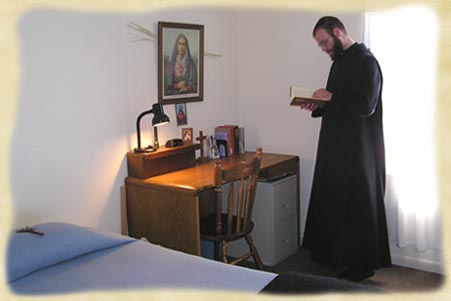
 piritual
reading (Lectio Divina) is one of the
most important elements in the life of a monk (and of the laity). It is food
for the soul. Yet, like the food that nourishes the body, a monk doesn’t truly
realize the importance of his Lectio until he tries to get on without it
for a while. Then he may suffer from spiritual malnutrition. This is why
certain periods of his day are devoted to the meditative reading of spiritual
books. Holy Scripture, the Fathers and Doctors of the Church, ascetical and
mystical works and the lives of the saints make up a monk’s Lectio Divina.
But it must be much more than just reading, it must be conducive to, and
permeated with, prayer. As he reads, a monk realizes that God is speaking to
his heart by means of the words of other men, and he learns to be attentive to
His voice. His intention is not to make himself learned or to become a scholar
or satisfy curiosity but to nourish in himself the desire to belong completely
to God and to find the path that will lead most directly to Him. He knows that
it doesn’t really matter if he is not able to remember everything that he
reads. The Blessed Abbot Blosius writes, “As a vessel that often receives fresh
water remains clean, although the water that is poured in is soon poured out
again; likewise, if holy doctrine often runs through his mind, although it is
soon forgotten, it keeps his mind fresh and clean.” The monk’s reading helps
him in his struggle to cooperate with God’s grace, and as long as he keeps it
up and continues to pray and to grope after God in the darkness of faith he
will eventually be lead to that union of his soul with Christ, the Incarnate
Word, that his heart so earnestly craves.
piritual
reading (Lectio Divina) is one of the
most important elements in the life of a monk (and of the laity). It is food
for the soul. Yet, like the food that nourishes the body, a monk doesn’t truly
realize the importance of his Lectio until he tries to get on without it
for a while. Then he may suffer from spiritual malnutrition. This is why
certain periods of his day are devoted to the meditative reading of spiritual
books. Holy Scripture, the Fathers and Doctors of the Church, ascetical and
mystical works and the lives of the saints make up a monk’s Lectio Divina.
But it must be much more than just reading, it must be conducive to, and
permeated with, prayer. As he reads, a monk realizes that God is speaking to
his heart by means of the words of other men, and he learns to be attentive to
His voice. His intention is not to make himself learned or to become a scholar
or satisfy curiosity but to nourish in himself the desire to belong completely
to God and to find the path that will lead most directly to Him. He knows that
it doesn’t really matter if he is not able to remember everything that he
reads. The Blessed Abbot Blosius writes, “As a vessel that often receives fresh
water remains clean, although the water that is poured in is soon poured out
again; likewise, if holy doctrine often runs through his mind, although it is
soon forgotten, it keeps his mind fresh and clean.” The monk’s reading helps
him in his struggle to cooperate with God’s grace, and as long as he keeps it
up and continues to pray and to grope after God in the darkness of faith he
will eventually be lead to that union of his soul with Christ, the Incarnate
Word, that his heart so earnestly craves.
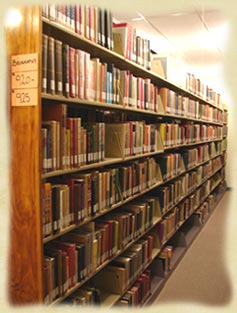
 f
course, monks don’t read spiritual books exclusively; they read a great variety
of things outside of the times set aside for Lectio Divina. The
monastery's private library contains approximately 14,000 volumes. Those who
are studying for the priesthood have their studies in philosophy and theology.
Some monks study languages, some like to read history or biographies, and some
study birds or botany or music. One might find on the desk of a monk a book on
small engine repair between a volume of St. Augustine’s sermons and a book of
Spanish poetry. This is a good thing, because without some sort of hobby or
diversion or form of relaxation the tensions and trials of the spiritual life
would become too much of a strain.
f
course, monks don’t read spiritual books exclusively; they read a great variety
of things outside of the times set aside for Lectio Divina. The
monastery's private library contains approximately 14,000 volumes. Those who
are studying for the priesthood have their studies in philosophy and theology.
Some monks study languages, some like to read history or biographies, and some
study birds or botany or music. One might find on the desk of a monk a book on
small engine repair between a volume of St. Augustine’s sermons and a book of
Spanish poetry. This is a good thing, because without some sort of hobby or
diversion or form of relaxation the tensions and trials of the spiritual life
would become too much of a strain.
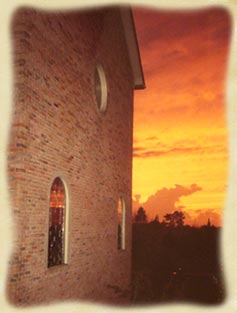
 espers,
the most solemn of the hours of the Divine Office begins at 5:15 PM. By this
time the sun has begun to light the clouds on fire in its setting. All the
activities, the work and the business that the monks were engaged in during the
day have been set aside. The community gathers in the church, as they have done
so often during the day, to praise God and offer Him their hearts.
espers,
the most solemn of the hours of the Divine Office begins at 5:15 PM. By this
time the sun has begun to light the clouds on fire in its setting. All the
activities, the work and the business that the monks were engaged in during the
day have been set aside. The community gathers in the church, as they have done
so often during the day, to praise God and offer Him their hearts.
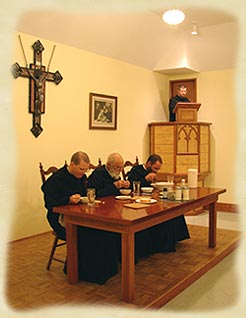
 fter
Vespers the monks have a short interval before they go to the refectory for
supper at 6:00. When the community has finished eating their bowls of soup and
has made another short visit to the Blessed Sacrament, they all come together
in a special part of the monastery for an hour of community recreation. This is
a time when all the monks can relax together. They talk and laugh and play
games and even listen to a little classical music. It is a time when they can
cultivate the most precious of gifts, that joy and lightness of heart which is
so necessary in the spiritual life. After all, the angels can fly only because
they take themselves lightly. If monks did not have times when they can unwind
a little, the spiritual life could become most difficult.
fter
Vespers the monks have a short interval before they go to the refectory for
supper at 6:00. When the community has finished eating their bowls of soup and
has made another short visit to the Blessed Sacrament, they all come together
in a special part of the monastery for an hour of community recreation. This is
a time when all the monks can relax together. They talk and laugh and play
games and even listen to a little classical music. It is a time when they can
cultivate the most precious of gifts, that joy and lightness of heart which is
so necessary in the spiritual life. After all, the angels can fly only because
they take themselves lightly. If monks did not have times when they can unwind
a little, the spiritual life could become most difficult.
 hen
the bell rings at 7:30 to signal the end of recreation the monks once again
make their way back to the church for Compline. As St Benedict directs in his
rule, Compline is preceded by a reading in common. For about 10 minutes the
reader for the week reads to the community from a lectern in the middle of the
choir. The readings before Compline are always spiritual in nature, whereas in
the refectory, books of a lighter nature are usually read: histories,
biographies or things of that kind.
hen
the bell rings at 7:30 to signal the end of recreation the monks once again
make their way back to the church for Compline. As St Benedict directs in his
rule, Compline is preceded by a reading in common. For about 10 minutes the
reader for the week reads to the community from a lectern in the middle of the
choir. The readings before Compline are always spiritual in nature, whereas in
the refectory, books of a lighter nature are usually read: histories,
biographies or things of that kind.
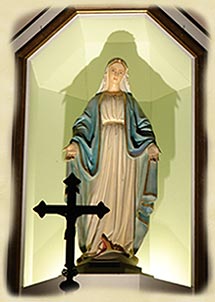
 ompline,
the monastic night prayer, is unvarying throughout the year. It is a perfect
prayer for the close of day, with its unchanging psalms. The evening hymn,
Te lucis ante terminum (To Thee before the close of day), with all the
concluding prayers, expresses the same unshaken confidence in God’s loving
protection for the coming night. At the end of Compline, as the tower bell
rings, the church is in darkness except for the one light shining on the statue
of our Lady. The monks sing a last hymn to her who is the Mother of God and
their spiritual mother, as a final tribute of their filial devotion. At the
close of this Office a deepened atmosphere of peace and recollection and
silence descends upon the monastery; then follows a few minutes of silent
prayer.
ompline,
the monastic night prayer, is unvarying throughout the year. It is a perfect
prayer for the close of day, with its unchanging psalms. The evening hymn,
Te lucis ante terminum (To Thee before the close of day), with all the
concluding prayers, expresses the same unshaken confidence in God’s loving
protection for the coming night. At the end of Compline, as the tower bell
rings, the church is in darkness except for the one light shining on the statue
of our Lady. The monks sing a last hymn to her who is the Mother of God and
their spiritual mother, as a final tribute of their filial devotion. At the
close of this Office a deepened atmosphere of peace and recollection and
silence descends upon the monastery; then follows a few minutes of silent
prayer.
 n
the silent darkness of the night the community then leaves the church. The
monks now have a little free time for reading or for some quiet work. They are
free to retire at any time before 9:30, when all must be in bed with lights
out.
n
the silent darkness of the night the community then leaves the church. The
monks now have a little free time for reading or for some quiet work. They are
free to retire at any time before 9:30, when all must be in bed with lights
out.
